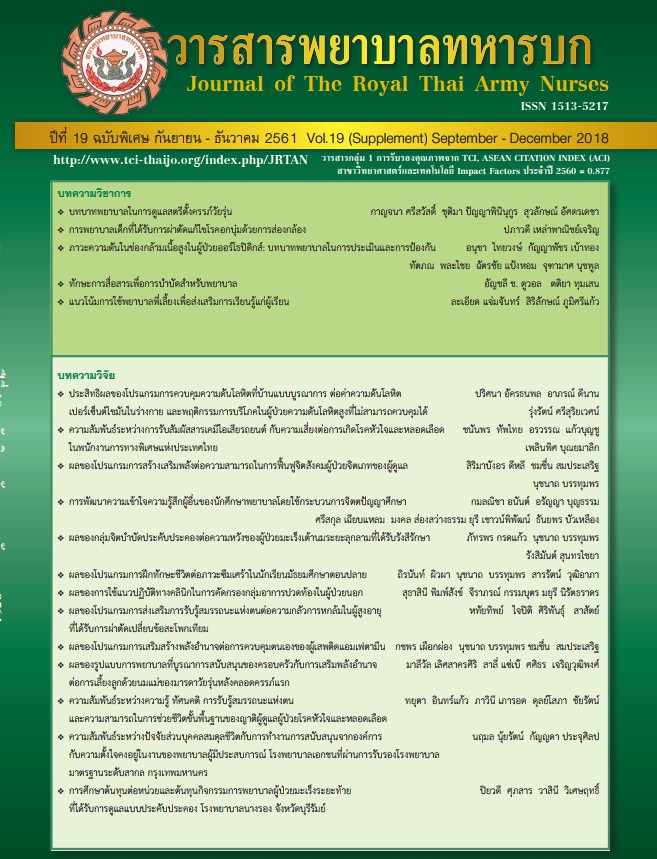The Effect Of Self–Efficacy Promoting Program on Fear of Fall in Postoperative Total Hip Replacement Older Persons
Keywords:
self-efficacy, fear of fall, total hip replacementAbstract
The quasi experimental research with two group pretest – posttest design aimed to study the effect of self-efficacy promoting program on fear of fall in postoperative total hip replacement older persons. The participants consisted of both male and female older persons admitted in orthopedic ward, Rajavithi hospital. The purpusesive sampling consisted of 44 older persons and random assignment in to control and experiment groups with similar characteristics in terms of age, gender and level of fear of fall. The experimental group underwent a self-efficacy promoting program and control group received conventional care. The self-efficacy promoting program was performed once a week for 4 weeks. The instruments were Self-efficacy promoting program, demographic questionnaire, Mini-Mental State Examination-Thai version 2002, and Fear of fall scale. The reliability of Fall Efficacy Scale, Thai Fall Efficacy Scale-international and Self-efficacy questionnaire were .81, .84 and .87 respectively. The data were analyzed using mean, percentage, standard deviation, and t-test. The significant difference was set at the .05 level. The research results were summarized as follows participants in experiment group after participating in self-efficacy promoting program had statistically significant lower fear of fall than before participating the program. And participants in experiment groups who participated in self-efficacy promoting program had statistically significant lower fear of fall than those who received conventional care.
Downloads
References
2. Thanutvanich Y and Julmet P. Transition in the lives of hospitalized elderly women after having sustained hip fracture. Journal of Faculty of Nursing,BUU. 2011; 11(2): 1-7. (in Thai)
3. Kressig RW, Wolf SL, Sattin RW, O’Grady M, Greenspan A, Curns A and Kutner M. Associations of demographic, functional, and behavioral characteristics with activityrelated fear of falling among older adults transitioning to frailty. Journal of the American Geriatrics Society. 2001; 49(11): 1456-1462.
4. Khuankwai K. Factors related to falls among community-dwelling elderly people. Unpublished master’s thesis). Khon Kaen University, Khon Kaen, Thailand. 2007. (in Thai)
5. Howland J, Lachman ME, Peterson EW, Cote J, Kasten L and Jette A. Covariates of fear of falling and associated activity curtailment. The Gerontologist. 1998; 38(5): 549-555.
6. Chandler JM, Duncan PW, Sanders L, Studenski S. The fear of falling syndrome: Relationship to falls, physical performance, and activities of daily living in frail older persons. Topics in Geriatric Rehabilitation. 1996 Mar 1;11(3):55-63.
7. Tamsat A. Fear of Falling and Functional Ability in Older Adults Undergoing Hip Surgery (Doctoral dissertation, Mahidol University). 2014. (in Thai)
8. Stone JT and Wyman JF. Clinical gerontological nursing: a guide to advanced practice. 2nd ed. Philadelphia: W.B. Saunders. 1999; 68-341.
9. Marungga L. Fear of falling experiences of older persons. (Unpublished master’s thesis). Chulalongkorn University, Bankok, Thailand. 2010. (in Thai)
10. Fuzhong L, McAuley E, Fisher KJ, Harmer P, Chaumeton N and Wilson NL. Self-efficacy as a mediator between fear of falling and functionalability in the elderly. Aging Health. 2002; 14(4): 452-66.
11. Hellstrom K, Vahlberg B, Urell C and Emtner M. Fear of falling, fall-related self-efficacy, anxiety and depression in individuals with chronic obstructive pulmonary disease. Clinical Rehabilitation. 2009; 23: 1136-1144.
12. Tinetti ME, Richman D and Powell L. Falls efficacy as a measure of fear of falling. Journal of Gerontology. 1990; 45(6): 239-243.
13. Fletcher PC and Hirdes JP. Restriction in activity associated with fear of falling among community-based seniors using home care services. Age and Ageing. 2004; 10: 1-7.
14. Bandura A. Self efficacy the exercise of control (4 thed.). United States of America: W. H. Freeman. 1997.
15. Thiamwong L. Psychometric Testing of the Falls Efficacy Scale-International. Songklanagarind Medical Journal. 2012 Mar 6;29(6):277-287. (in Thai)
16. Rittiwong T. The effect of perceived self-efficacy promoting program in weight reduction on the severity of knee osteoarthritis in overweight older persons. (Unpublished master’s thesis). Chulalongkorn University, Bankok, Thailand. 2010. (in Thai)
17. Wirojyuti S, Kengganpanich M, Kengganpanich T, Tansakul S. Effectiveness of Post Surgery Rehabilltatinon Program for Elderly Patients with HIP Fractuer in Phramongkutklao Hospital. Journal of The Royal Thai Army Nurses.;15(2): 187-194. (in Thai)
18. Thanyasawad T, Sappayanon S, Thongklom C, Kogchana W, Moolsin P, Boonthuk P, Jungsuvadee Hathirat. A Study of Barthel Activities of Daily Living In Elderly patient Hip Replacement. Journal of The Royal Thai Army Nurses.;19(1):201-209. (in Thai)
Downloads
Published
How to Cite
Issue
Section
License
บทความหรือข้อคิดเห็นใดใดที่ปรากฏในวารสารพยาบาลทหารบกเป็นวรรณกรรมของผู้เขียน ซึ่งบรรณาธิการหรือสมาคมพยาบาลทหารบก ไม่จำเป็นต้องเห็นด้วย
บทความที่ได้รับการตีพิมพ์เป็นลิขสิทธิ์ของวารสารพยาบาลทหารบก
The ideas and opinions expressed in the Journal of The Royal Thai Army Nurses are those of the authors and not necessarily those
of the editor or Royal Thai Army Nurses Association.






